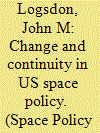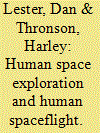|
|
|
Sort Order |
|
|
|
Items / Page
|
|
|
|
|
|
|
| Srl | Item |
| 1 |
ID:
105510


|
|
|
|
|
| Publication |
2011.
|
| Summary/Abstract |
2010 saw both the unveiling of a new US National Space Policy and the announcement of a fundamentally different strategy for US human spaceflight that would move from the NASA-government-led Apollo-style approach to a greater reliance on the private sector and international cooperation. This viewpoint puts forward arguments on why change in the US approach to human spaceflight is needed, while acknowledging that achieving it in the face of vested interests and threats to jobs and livelihoods is extremely difficult. It suggests that greater US recognition of the need to ensure the sustainability of space activity (by addressing debris, radio-frequency interference and potential deliberate disruption of spacecraft), and an apparent willingness to countenance international norms to govern space activities, could be the new policy's most lasting heritage.
|
|
|
|
|
|
|
|
|
|
|
|
|
|
|
|
| 2 |
ID:
157169


|
|
|
|
|
| Summary/Abstract |
This paper defends, and emphasizes the importance of, spaceflight, broadly construed to include human and unmanned spaceflight, space science, exploration and development. Within this discourse, I provide counter-replies to remarks by physicist Dr. Steven Weinberg against my previous support of human spaceflight. In this defense of peaceful spaceflight I draw upon a variety of sources. Although a focus is human spaceflight, human and unmanned modes must not be treated as an either-or opposition. Rather, each has a critical role to play in moving humanity forward as a spacefaring species. In the course of this communication, I also stress the perennial role of space agencies as science and technology-drivers, and their function to provide a stable and unified platform for space programs.
|
|
|
|
|
|
|
|
|
|
|
|
|
|
|
|
| 3 |
ID:
106910


|
|
|
|
|
| Publication |
2011.
|
| Summary/Abstract |
The role of telerobotics for space exploration in placing human cognition on other worlds is limited almost entirely by the speed of light, and the consequent communications latency that results from large distances. This latency is the time delay between the human brain at one end, and the telerobotic effector and sensor at the other end. While telerobotics and virtual presence is a technology that is rapidly becoming more sophisticated, with strong commercial interest on the Earth, this time delay, along with the neurological timescale of a human being, quantitatively defines the cognitive horizon for any locale in space. That is, how distant can an operator be from a robot and not be significantly impacted by latency? We explore that cognitive timescale of the universe, and consider the implications for telerobotics, human spaceflight, and participation by larger numbers of people in space exploration. We conclude that, with advanced telepresence, sophisticated robots could be operated with high cognition throughout a lunar hemisphere by astronauts within a station at an Earth-Moon L1 or L2 venue. Likewise, complex telerobotic servicing of satellites in geosynchronous orbit can be carried out from suitable terrestrial stations.
|
|
|
|
|
|
|
|
|
|
|
|
|
|
|
|
|
|
|
|
|